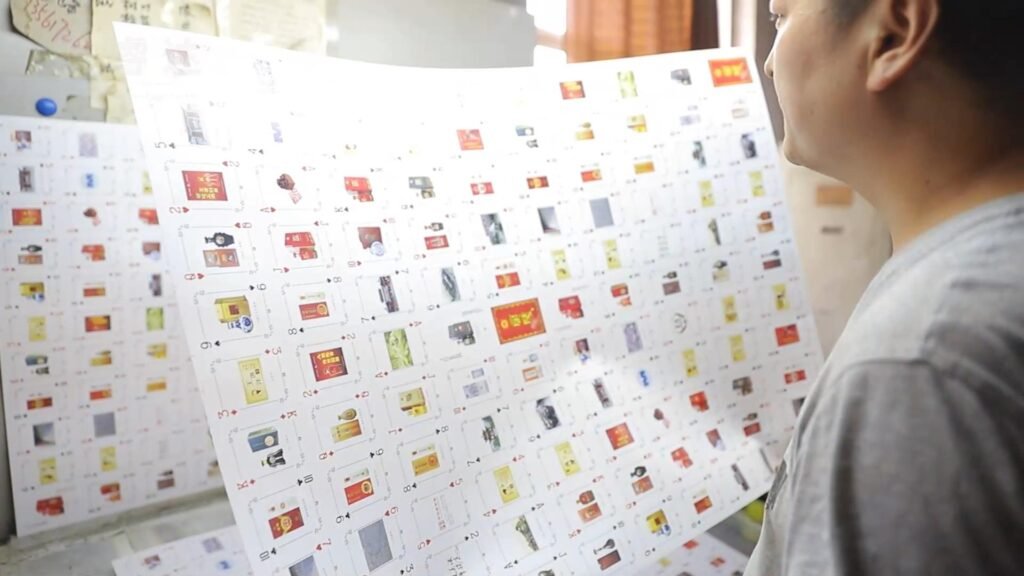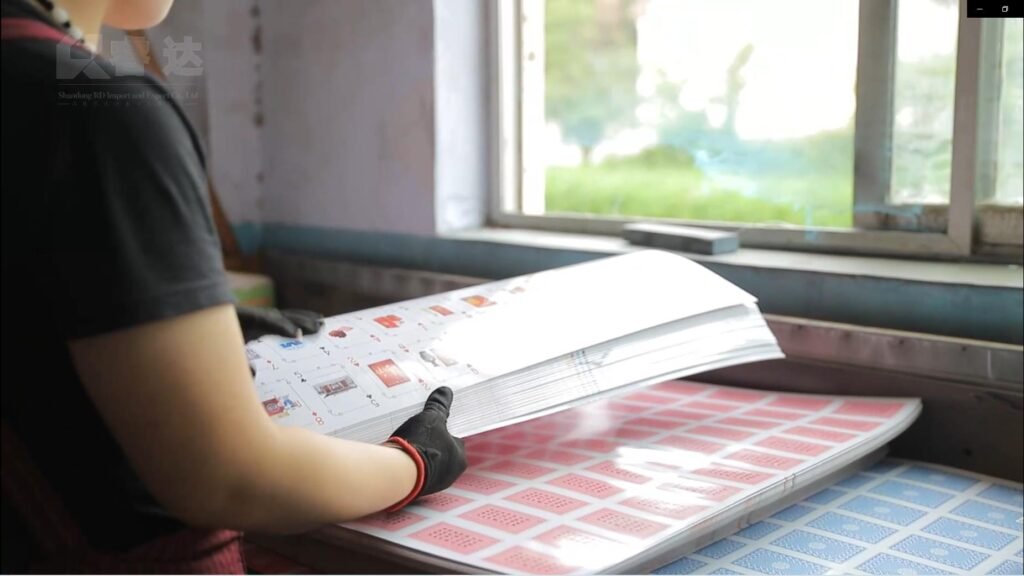1.Quality inspection
1.1 Raw material inspection
1) Paper
First analyze the paper used in playing cards. The paper material used for playing cards is customized by the paper mill. The two layers of cardboard are glued by colored glue. This structure prevents the cardboard from being seen through.
Usually we say that 280 grams and 300 grams of playing cards refer to the weight of playing card paper, which is the weight of 1 square meter of paper. 280 grams of playing cards means 1 square meter of paper weighs 280 grams. 300 grams of playing card paper means 1 square meter of paper weighs 300 grams.
It is not that the higher the gram, the better the paper. The content of wood pulp determines the price of paper and its quality. The more wood pulp, the higher the price. High-end playing card paper contains wood pulp, which is wood fiber.
2) Ink
At present, there are two kinds of imported ink and domestic ink. The ink needs to go through a minimum of color, viscosity and solubility tests. Choose high-quality inks with high gloss, high color density, good wear resistance, quick-drying and non-skinning.
1.2 Production inspection
1) Test sample image

Before making the printing template, the technician should check the design of the card board. Not just checking the version on the computer, but also printing out a low-resolution sample image. Carefully check the suit, order, color and layout of each card. You can go to print after confirming that the sample drawings are correct.
2) Large page detection
During the production process, the paper will be randomly checked for various printing errors or ink stains. Remove the defective paper before cutting.

3) Appearance inspection
After cutting, filleting, and plastic packaging, some of the finished cards are randomly selected. Professional quality inspectors observe and record the aesthetics of the surface of this batch of cards, the smoothness of the edges, and the cleanliness of the packaging.
1.3 product testing
The finished cards will be handed over to a third-party testing agency for testing of the following items:
| No. | Project | Quality Level | |||
|---|---|---|---|---|---|
| Premium product | First grade product | Qualified product | |||
| 1 | Folding resistance/sheet | >200 | >100 | >20 | |
| 2 | Longitudinal stiffness | 65-95 | 60-90 | ||
| 3 | Elasticity | ≤2.0 | |||
| 4 | Chromatic aberration | ≤1.2 | ≤1.5 | ≤2.0 | |
| 5 | Glossiness | 15-35 | 20-40 | 20-50 | |
| 6 | Slip | ≤0.2 | ≤0.25 | ≤0.3 | |
| 7 | Color difference | The pattern is clear, the ink color is uniform, and the color deviation does not exceed 0.1mm | The pattern is clear, the ink color is uniform, and the color deviation does not exceed 0.2mm | The pattern is clear, the ink color is uniform, and the color deviation does not exceed 0.3mm | |
| 8 | Spot | Front | ≤0.3 No more than 1 point per sheet | ≤0.5 No more than 1 point per sheet | ≤0.5 No more than 2 point per sheet |
| Back | No obvious dark spots on the white edge | ||||
| 9 | Margin | Front | ≤1.0 | ≤0.2 | ≤2.0 |
| Back | ≤1.5 | ||||
| 10 | Rounded | Uniform rounded corners, no curling | Uniform rounded corners, without obvious curling | ||
1) Size error; 2) Folding resistance; 3) Longitudinal stiffness; 4) Elasticity; 5) Color difference;
6) Glossiness; 7) Static friction coefficient; 8) Rounded; 9) Spot; 10) Margin.
1.4 Storage test
1) The paper used for playing cards needs to be absolutely flat from storage to manufacturing. The warehouse will use an industrial humidifier to control the humidity of the card paper to prevent the cardboard from deforming due to drying. Therefore, workers regularly check the temperature and humidity of the paper. The method is to insert a flat detector uniformly at 1.2 meters below the top of a stack of 3000 sheets of paper.
1.5 Good quality playing cards usually have the following characteristics:
1) Good hand feel; 2) Good elasticity; 3) High folding resistance;
4) Clear printing effect; 5) Durable; 6) No light transmission;
7) The edges of playing cards are sharp and angular; 8) Good moisture-proof effect.
1.6 Third party quality inspection company
SGS, BV, ICTI, TUV, etc. Take the application for SGS audit factory audit as an example. Go through the following steps:
1) Inquiry. Inform SGS representative of audit criteria, final buyer or audit requirements.
2) Fill in the form. Fill in and emails back the “Inquiry Application Form” sent to you by SGS.
3) Quotation. SGS generally issues an audit quotation within two working days for your reference.
4) Payment. Confirms the quotation and pays.
5) Schedule. SGS determines the audit time according to the client’s expected date and the audit schedule.
6) Audit. SGS auditors will go to the factory for audit on the agreed audit date.
7) Report. SGS will issue an audit report on the 5th working day after the audit.

2.Certification to be passed by the card deck
2.1 What certifications do the raw materials of the cards go through
FSC certified. Procurement of raw materials produced in FSC certified factories right from the start.
2.2 What certification do cards sold to children need to pass
1) Children’s toy cards on Amazon require CPC certification. In the United States, all toys intended for children 12 and younger must meet federal safety standards. Follow the toy CPSC testing standards. The CPC certificate must be based on the test results of a CPSC-accredited third-party testing laboratory.
2) The EU has to do CE-EN71 certification. The EN71 directive is one of the directives under CE certification. Toy products are subject to EN71 directive. CE certificate can be issued only after passing the test. Whereas the EN71 Toys Directive applies to any product or material designed or intended to be played by children under the age of 14.
2.3 What certification does a card factory need to pass
1) ISO9001 quality system certification applied by the manufacturing industry. ISO14001 environmental management system certification.
2) If want to produce and sell Disney cartoon character products, factory must pass Disney certification.
If want to know more about factory production cards, please subscribe to RDCard.
